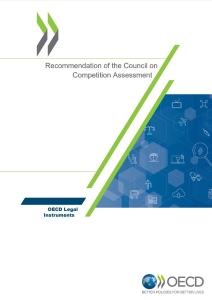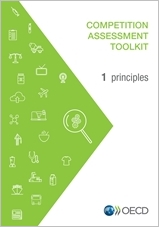Concurrence
OECD Recommendation on Competition Assessment
|
On 22 October 2009, the OECD Council adopted a Recommendation that calls for governments to identify existing or proposed public policies that unduly restrict competition and to revise them by adopting more pro-competitive alternatives. The Recommendation, which was revised in December 2019, calls for governments to establish institutional mechanisms for undertaking such reviews. A number of approaches to competition assessment are possible. The OECD's Competition Assessment Toolkit outlines one approach.
Download the text of the Recommendation
Unofficial translations Italian | Spanish | Portuguese | Greek | Turkish | Croatian
The rationale for the Recommendation
Increased competition contributes to higher economic productivity and growth. In many jurisdictions, however, laws, regulations or other government-imposed barriers unduly restrain market activities. One important step to eliminate these restraints is “competition assessment”, that is, the evaluation of policies to find those unnecessarily restricting competition in order to develop alternative policies that achieve the same objectives, with lesser harm to competition.
Scope of the Recommendation
The recommendation applies to OECD member countries. Other economies are welcome to associate themselves to the recommendation. The scope of policies covered by the recommendation includes government regulations, rules and legislation. 2014 Implementation Report and the revision of the OECD Competition Assessment Toolkit
In 2014, the OECD carried out the first review of OECD member countries experiences with the application of the 2009 Recommendation on competition assessment. The resulting implementation report, Experiences with Competition Assessment 2014, describes the assessment processes currently in use as well as specific examples of competition assessments in different jurisdictions. The review also concluded that the OECD Competition Assessment Toolkit could be expanded. A third volume of the toolkit together with a revision of its two previous volumes were released in 2015. In addition, in 2019, the Toolkit was revised in light of the changes brought about by digitalisation. |
See also |
| Learn more about the OECD Competition Assessment Toolkit | |
|
Greece, Iceland, Mexico, Portugal, Tunisia, Iceland and ten ASEAN countries have already used the toolkit to assess competition-distorting rules in targeted sectors of their economies. Read more about their experiences: |
|
Documents connexes

